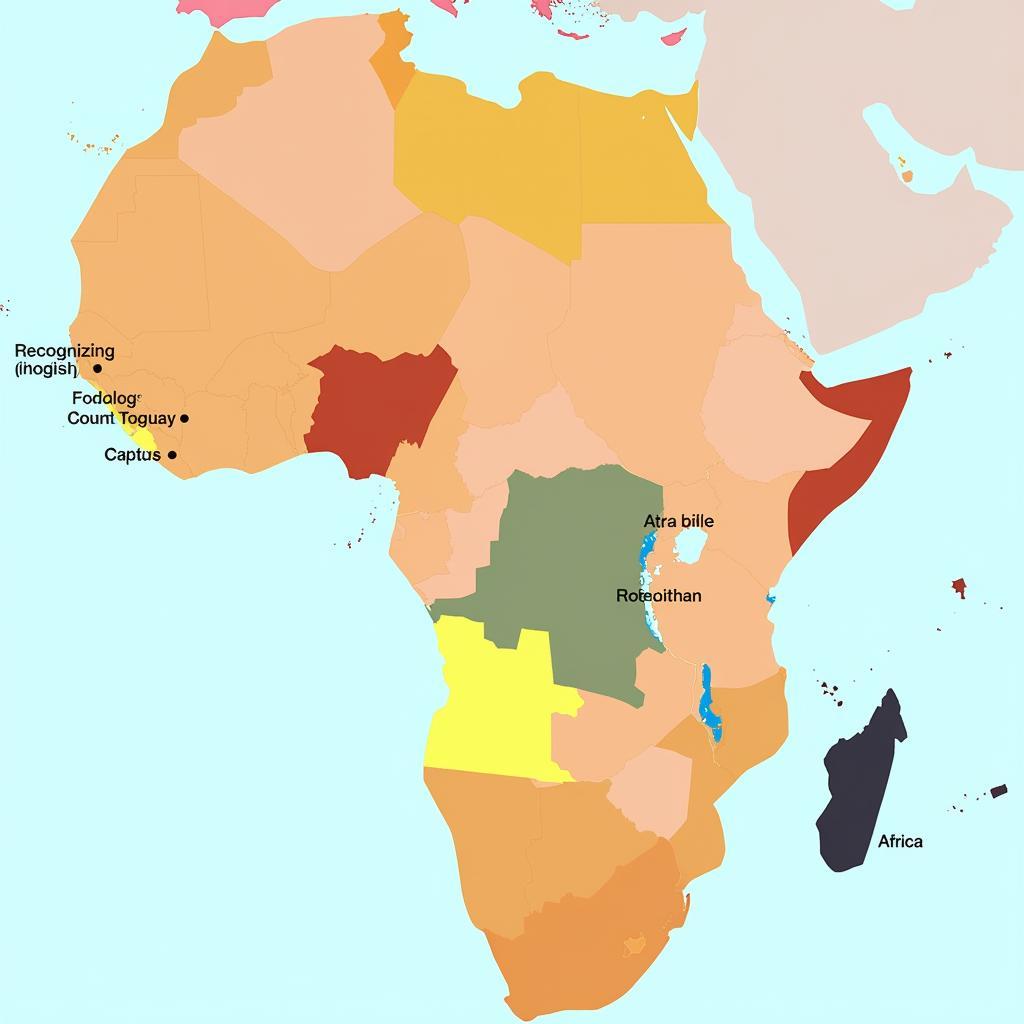African Countries with English as a First Language
English, a language with global reach, serves as the first language in several African nations, a testament to the continent’s diverse history and cultural tapestry. These countries, spread across different regions, use English not just for official purposes but also in everyday life, media, and education. Understanding which African countries have English as a first language provides valuable insight into the continent’s linguistic landscape and its post-colonial legacy.
Exploring English-Speaking Africa: A Linguistic Journey
From bustling cities to serene villages, English resonates across a variety of landscapes and cultures within Africa. These countries often share a common thread, linked by their colonial past with Britain. But their unique identities shine through, adapting the English language with local dialects and nuances, creating vibrant and distinct versions of the language. Let’s delve deeper into this fascinating linguistic landscape.
Which African Countries Speak English as Their First Language?
Several African countries claim English as their first language. These nations, scattered across East, West, and Southern Africa, showcase the enduring influence of the British Empire. While official lists can vary, some of the most recognized include:
- Nigeria: The most populous nation in Africa, Nigeria boasts a rich tapestry of languages, with English serving as the official language, uniting its diverse ethnic groups.
- Ghana: Located in West Africa, Ghana’s adoption of English as its official language has facilitated communication and trade within the country and internationally.
- Kenya: A vibrant East African nation known for its stunning wildlife and diverse cultures, Kenya utilizes English in government, education, and commerce.
- Uganda: Situated in East Africa, Uganda recognizes English as its official language, facilitating communication across its diverse linguistic landscape.
- Zambia: In Southern Africa, Zambia’s adoption of English as the official language has played a crucial role in its post-independence development.
- Zimbabwe: Neighboring Zambia, Zimbabwe also utilizes English as its official language, reflecting its historical ties to Great Britain.
- South Africa: Known for its diverse cultures and landscapes, South Africa recognizes 11 official languages, including English, reflecting its complex history. English plays a prominent role in government, media, and business.
- Botswana: Located in Southern Africa, Botswana utilizes English as its official language, fostering communication and development.
- Namibia: A country rich in natural beauty, Namibia also uses English as its official language, reflecting its colonial past.
- Rwanda: While Kinyarwanda and French are also official languages, English has gained increasing importance in Rwanda, particularly in education and government.
- South Sudan: The world’s youngest nation, South Sudan, has adopted English as its official language, aiming to unify its diverse population and foster international relations.
- Liberia: Situated in West Africa, Liberia considers English as its official language, reflecting its unique history as a nation founded by freed American slaves.
- Sierra Leone: Also located in West Africa, Sierra Leone uses English as its official language, facilitating communication and trade.
- The Gambia: The smallest country in mainland Africa, The Gambia also utilizes English as its official language.
 Map of English-Speaking African Countries
Map of English-Speaking African Countries
The Role of English in Modern Africa
English plays a vital role in these African nations, facilitating communication across diverse ethnic and linguistic groups. It’s the language of education, government, and commerce, connecting these countries to the global stage.
Why is English Spoken in These Countries?
The prevalence of English in these African countries is primarily a result of British colonialism. While this historical influence shaped the linguistic landscape, these nations have embraced and adapted the language, making it their own.
“English provides a crucial bridge for communication and development in many African countries,” says Dr. Anika Sharma, a linguist specializing in African languages. “It allows these diverse nations to connect with the global community and access vital resources and opportunities.”
The Future of English in Africa
As Africa continues to evolve, the role of English is likely to remain significant. While preserving and promoting indigenous languages is crucial, English provides a valuable link to global opportunities in education, trade, and technology.
“The future of English in Africa is dynamic and intertwined with the continent’s growth and development,” explains Professor Kwame Asante, a historian specializing in post-colonial Africa. “It’s a tool for progress, connecting these nations to the global economy and fostering international collaboration.”
Conclusion
The African countries with English as a first language represent a unique blend of cultures and linguistic diversity. While their shared colonial past shaped their linguistic landscape, they have embraced English, adapted it, and made it their own. Understanding the role of English in these nations provides valuable insights into the continent’s rich history, present dynamics, and future potential. English will undoubtedly continue to play a vital role in the continued growth and development of these nations.
FAQ
-
How many countries in Africa have English as a first language? The exact number varies depending on the definition of “first language,” but generally, over a dozen countries recognize English as an official or primary language.
-
Why is English an official language in so many African countries? The legacy of British colonialism is the primary reason for the widespread use of English across Africa.
-
Is English the most spoken language in Africa? While English plays a significant role, it is not the most spoken language overall. Numerous indigenous African languages have far more speakers.
-
How does English influence the culture of these African countries? English has impacted education, media, and business, connecting these countries to global opportunities and influencing cultural exchange.
-
What are some examples of how English is used in daily life in these countries? English is used in schools, government offices, businesses, and media, as well as in informal social settings.
-
Are there different dialects of English spoken in different African countries? Yes, distinct variations and accents have emerged in each country, reflecting local linguistic influences.
-
Is it important to learn English if you’re traveling to these countries? While knowing some local languages is always beneficial, English is widely understood and spoken in urban areas and tourist destinations.
Need more information?
Explore other articles on our website about specific countries and their cultures, languages, and history. Learn more about the diversity of African languages and the impact of colonialism on language and culture.
For any assistance, please contact us: Phone: +255768904061, Email: [email protected] or visit us at Mbarali DC Mawindi, Kangaga, Tanzania. We have a 24/7 customer service team.

